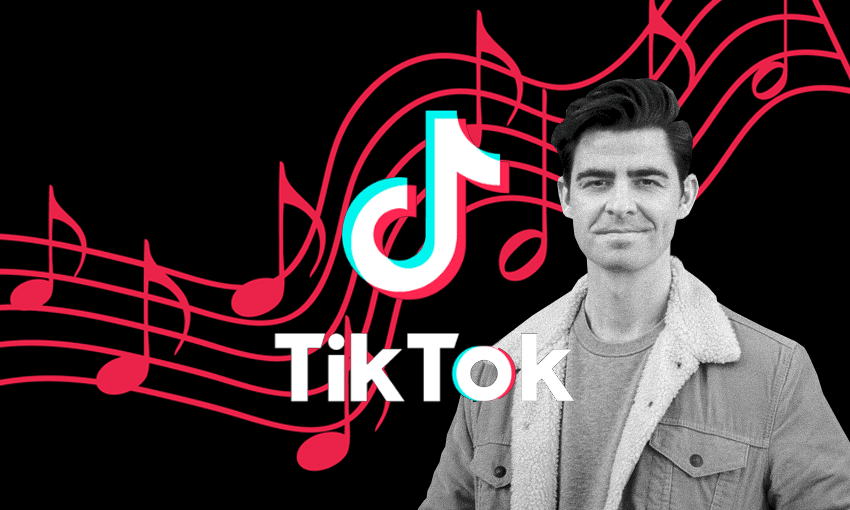Aucklander and Triple J veteran Ollie Wards has landed a role as Tiktok’s first director of music for Australia and New Zealand. He talked to The Spinoff about what’s in store.
TikTok is looking unstoppable. Trump wants to ban it, Microsoft wants to buy it, and the Chinese government is allegedly using it for propaganda. In two years TikTok has made enemies, sure; but it’s made many more legions of fans.
Music has been at the heart of TikTok, owned by Chinese company Bytedance, since its birth as a lip-syncing app. It grew to encompass comedy, fashion, cooking, frogs, and every other possible viewing niche, but music is still at its core. Music backs the to-camera spiels, and provides a rhythm for Vine-like comedies. It weaves through outfit changes and tells us the thoughts of a Russian llama. This week, Ollie Wards became TikTok’s first ever director of music for Australia and New Zealand. He’s got a big job ahead.
“I’m the first hire in the music team,” he said. “Well, I am the music team in this part of the world.” Wards was at Australia’s Triple J radio station for 10 years, first as a breakfast show producer in 2010, and later as network head and a main driver behind the station’s Hottest 100 and Like a Version initiatives. He also worked on the Unearthed programme, hunting out new and independent musicians.
He was discovering new music at Triple J, and now he’s doing the same at TikTok – why make the move? “[TikTok] feels like one of those exciting revolutions in tech and the internet, and if you don’t want to be part of that, what do you want to be part of?” he said. “It’s a fast-moving wave, and I want to surf it.”
Labels use the app to search for new talent to add to their books, and already-signed talent – like Benee – can get airplay on the other side of the world. Since 2017, more than 50 songs originating on the platform entered the top 25 on the US Billboard charts.
Wards is an Aucklander living in Sydney; he’s the perfect bridge between the antipodes and the rest of the world. “Having the remit across Australia and New Zealand – there’s a lot to take in there,” he said. “While I’ve got my secret allegiances with the clipped vowels, I’ll need to work out how to best be across both sides of the ditch.”
His job is to facilitate the connection between the music industry and the 500 million people who use TikTok. “It’s user-generated content, so the amount of influence I have as to how people shape stories and content would be reasonably limited,” he said. “It’s making sure the right song is in the right place at the right time, or if something is organically growing then I’ll need to see that and emphasise that.”
“What we got really humming at Triple J was our editorial policies and how we could choose what gets surfaced,” he said. He sees his role at TikTok as a similar project, but hugely scaled up. “It’s a massive opportunity for Kiwi and Aussie artists to cut through on a global platform. A single platform, as well. You’re talking to hundreds of millions of users worldwide.”
“A real focus of mine is going to be collecting the best of the Australian and New Zealand artists on TikTok and sending them out to the rest of the teams to try and emphasise them.”
Outside of major viral breakthroughs like Benee and Jawsh685, local artists are hard to spot on the app; and while TikTok has Spotify playlists, they’re not categorised into region-specific artists. “It is really hard to say ‘what are the local acts that are doing well on the platform?’ So I’ll definitely be making those lists,” he said.
He’s told stories before, most compellingly in the shape of a podcast that tried to hunt down the con-woman who rinsed his family. Wards has a knack for narrative, but might be leaving it to the TikTok video pros. “I don’t mind telling a story, but I reckon if I do that it’ll be about telling the story of the artists.” He points to local band L.A.B. as an example. “I didn’t realise they had those guys from Kora and Katchafire,” he said. “Each band has a story to tell, and I can use TikTok to tell those stories, I guess.”
There are various levels of curation on TikTok. There’s the discover page, and categories encompassing every style of song search. “You can search by vibe or lyrics or genre, that kind of stuff,” he said. He’s the one who’ll figure out what goes in those boxes.
Some songs are better primed for TikTok than others, whether intentional or not. “Drake’s Toosie Slide is very influenced by TikTok as a platform,” he said. There are 5.4 million TikToks using the song. Canadian rapper bbno$ has several songs that have gone viral on the app, giving our own Benee a run for her money. It all seems organic, but bbno$ and frequent collaborator Yung Gravy nod to the app in Shining on My Ex with the lyric “dude, I’d be pissed if this song blew up on TikTok”.
Wards doesn’t want new artists to design their work for TikTok. “I would never want to influence how artists create their music,” he said “I think great music comes from artists expressing themselves.”
“The second that artists start reworking their music or their art for any platform, I think it will steer them away from the core of art, which is self-expression.”
He said there are ways artists can use the platform to get their stuff out there, but the song creation itself is something that should remain in the music industry’s purview, not TikTok’s. The key relationship is between the music industry and labels and the app. “I’m just the grease between them.”



